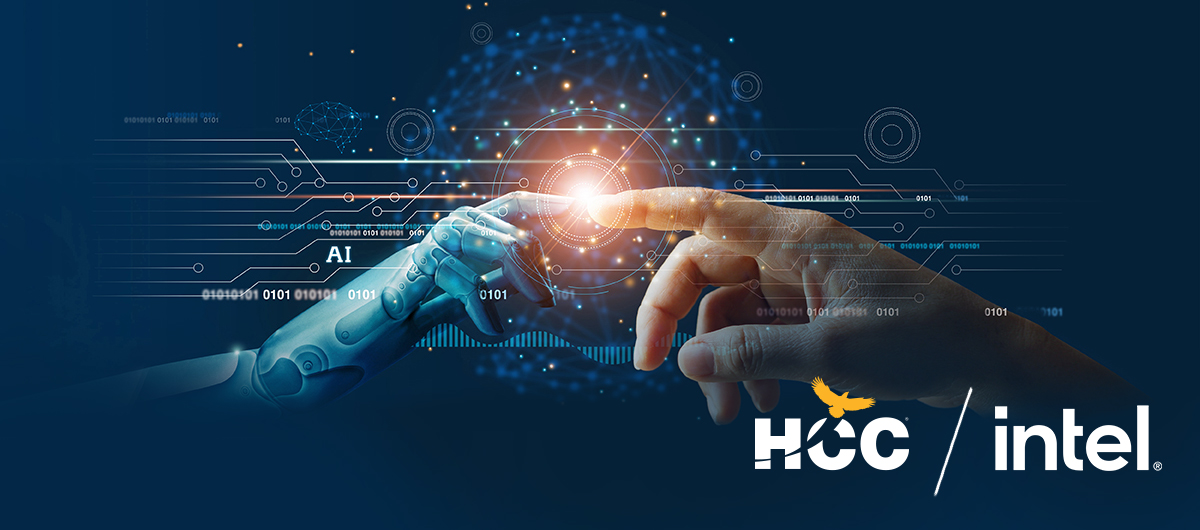Artificial Intelligence

About the Program
Artificial Intelligence is the current, future discipline fostering the next generation of Computer Science, Networking, Cloud and High Performance Computing environments.
The HCC AI program has garnered curricular and technical support through HCC’s partnerships with industry leaders such as Intel, Microsoft and Amazon in efforts to train students for a broad range of in-demand careers that call for AI skills.
HCC-Intel Partnership
Intel Corp. became the latest partner of the HCC Artificial Intelligence associate degree program starting in August 2021 to provide curricular enrichment, faculty development and career-oriented student support.
Intel offers additional instructional content for the HCC AI program to allow students to develop skills in data collection, AI model training, coding, and exploring the societal impact of AI technology. The company also provides technical advice, faculty training, summer internships, and mentors for students and faculty.
AWARD TYPES: Associate of Applied Science
AREA OF STUDY: Science, Technology, Engineering & Math
Degrees and Certificates
Learn more about the Degrees and Certificates offered by this program by visiting the HCC Catalog.
Program Outcomes
STUDENTS WILL BE ABLE TO:

Apply the fundamental principles of computer programming including requirements specifications analysis, algorithm design and verification, documentation and implementation and testing.

Develop AI applications that demonstrate learning, analysis, goal setting, autonomy and control system rigor for machine learning and natural language processing.

Analyze a real‐world problem, identify, cost justify and specify an effective AI computing solution with universal application.
Program Information
General Requirements
Artificial Intelligence (A.I.) is the current, future discipline fostering the next generation of Computer Science, Networking, Cloud and High Performance Computing environments. A.I. encompasses machine learning, deep learning, image recognition, ray tracing, VR, simulation, natural language processing, autonomous machines (vehicles, robots, factory), RPA (digital Robot Process Automation), blockchains and Data Science. Artificial Intelligence is being universally applied across all industries at an unprecedented pace. This is one field that literally affects all others and needs every level of entry personnel.
TSI testing required prior to first enrollment for all AAS degrees and Level II certificates.
Workforce information
The AAS in Artificial Intelligence provides a “State-of-the-Art” introduction to most all aspects of Intelligent Technologies (ranging from IIOT/Edge – Cloud – High Performance Computing). The Artificial Intelligence AAS is packed with the very latest information, case studies, “hands-on-models/labs” and connections/references to the world’s leading Companies and Practitioners. The goal of the program is to provide a real-world sampling of exactly what it takes to participate professionally in Artificial Intelligence. This may be the finest AI “Best Practices” preparation program available, built so you can properly choose your next move.
Outcomes, Skills and Abilities
The World Economic Forum, for example, predicts AI may lead to a net increase of 58 million jobs globally.
No matter what the new AI economy means for the future workforce, college students and young professionals stand to benefit from entering this burgeoning field. But breaking into artificial intelligence isn't as simple as learning computer science or earning a college degree. It takes initiative, guts, and know-how to engineer a career in AI. In fact, more than half of senior AI professionals report there is a skills gap in the recruitment of new scientists — a veritable "talent crisis," according to an Ernst & Young report.
The most successful AI professionals often share common characteristics that enable them to succeed and advance in their careers. Working with artificial intelligence requires an analytical thought process and the ability to solve problems with cost-effective, efficient solutions. It also requires foresight about technological innovations that translate to state-of-the-art programs that allow businesses to remain competitive. Additionally, AI specialists need technical skills to design, maintain and repair technology and software programs. Finally, AI professionals must learn how to translate highly technical information in ways that others can understand in order to carry out their jobs. This requires good communication and the ability to work with colleagues on a team. Problem Solving, technical communication (written/verbal), verification skills, project management, cost benefit analysis capabilities, multi-level security awareness and delegation skills are just a few of the skills required in Artificial Intelligence.
Automation, robotics and the use of sophisticated computer software and programs characterize a career in artificial intelligence (AI). Candidates interested in pursuing jobs in this field require specific education based on foundations of math, technology, logic, and engineering perspectives. Written and verbal communication skills are also important to convey how AI tools and services are effectively employed within industry settings. To acquire these skills, those with an interest in an AI career should investigate the various career choices available within the field.
Guidelines
Dan Ayoub, General Manager for mixed reality education at Microsoft.
Ayoub suggests that reviewing individual job postings on LinkedIn will give you an idea of the types of roles available and the skills required. This is especially important given the variety of languages, tools, and frameworks needed for artificial intelligence jobs. While not an exhaustive list, below are some examples of skills that can help candidates check off all the right boxes in a job posting.
- Programming Languages: Python, Java, C/C++, SQL, R, Scala, Perl
- Machine Learning Frameworks: TensorFlow, Theano, Caffe, PyTorch, Keras, MXNET
- Cloud Platforms: AWS, Azure, GCP
- Workflow Management Systems: Airflow, Luigi, Pinball
- Big Data Tools: Spark, HBase, Kafka, HDFS, Hive, Hadoop, MapReduce, Pig
- Natural Language Processing Tools: spaCy, NLTK
Employment
Examples of specific jobs held by AI professionals include:
- Software analysts and developers and programmers.
- Computer scientists, computer engineers, cyber security specialists.
- Algorithm specialists, Data Scientists, Data Engineers, Data Researchers.
- Research scientists, engineering consultants, Cloud Computing Specialists.
- Mechanical engineers and maintenance technicians.
- Manufacturing and electrical engineers. Software analysts and developers.
- Algorithm specialists.
- Research scientists, Engineering consultants, Robotic process automation.
- Mechanical engineers, maintenance technicians, Call Center/Help Desk Process Automators.
- Manufacturing, electrical engineers, Edge Computing Platforms.
- Surgical/healthcare technicians working with robotic tools.
- Medical health professionals working with artificial limbs, prosthetics, hearing aids and vision restoration devices.
- Military and aviation electricians working with flight simulators, drones and armaments.
- Graphic art designers, digital musicians, entertainment producers, textile manufacturers and architects.
Additional Employment Information
The estimated annual job openings is approx. 3,000+ jobs a year.
- Median Wages - $79 hourly, $92,000 - $150,000 annually.
- Job Roles and the shift from Computer Software Developers to AI Developers.
The proposed degree program for Artificial Intelligence will prepare students for the following entry‐level job roles:
- A.I. Application Developer
- A.I. Software Architect
- Artificial Intelligence Developer (software)
These new job roles are remarkably similar to Software Developers, (SOC 15‐1132) Computer and Information Research Scientists (SOC 15‐1111) and Computer Occupations All Other (SOC‐15‐1199). With more training or an AAS Award in Artificial Intelligence, the newly trained can qualify for jobs. Existing software developers, who would like to increase their pay, can benefit equally as well. Because there is an acute labor shortage, one group does not detract from the other group. If you are computer-based tech, the high paying jobs await you.
Resources
Request more information


.jpg)